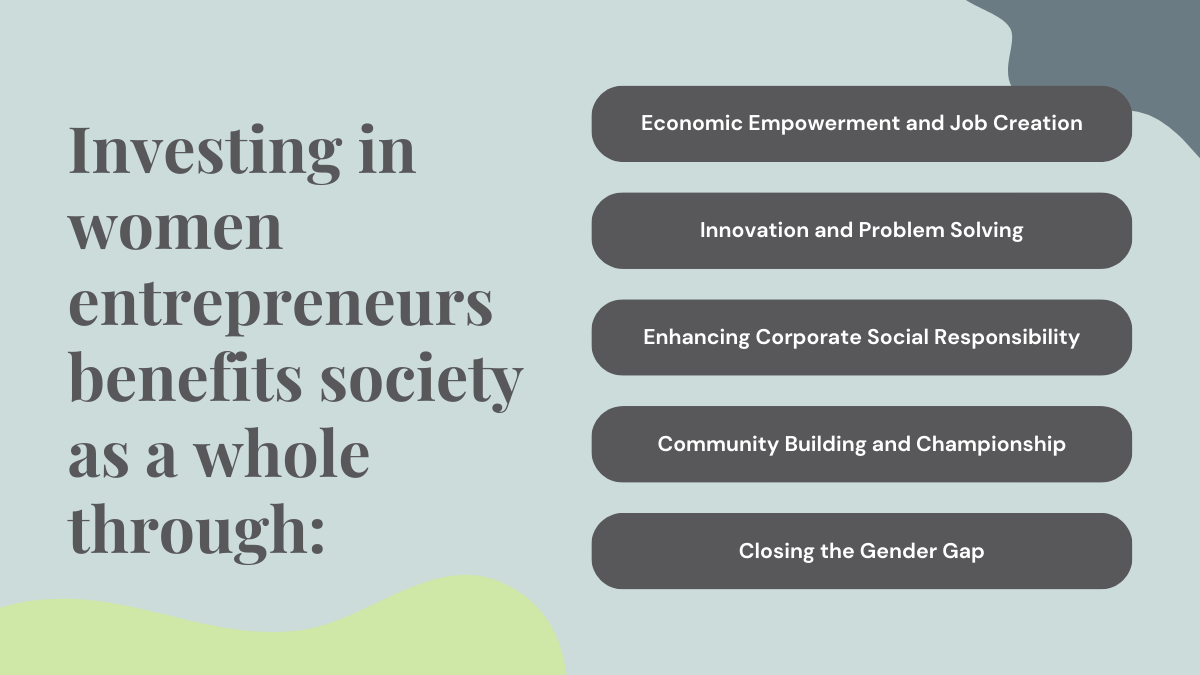Why Investing in Women Entrepreneurs Benefits Everyone
The key to unlocking innovation and economic growth in the dynamic landscape of entrepreneurship: diversity and inclusion.
We constantly go back to the question that drives the mission for us and our sister company, The51: How can Canada’s economy reach its true potential if 51 per cent of the population isn’t fully participating?
As the world recognizes the potential within all communities, it’s clear that there needs to be more focus on championing women entrepreneurs. Investing in women entrepreneurs not only promotes gender equity but also benefits society as a whole in countless ways—from job creation to social and environmental responsibility and everything in between and beyond.
Economic Empowerment and Job Creation
The case for investing in women-led ventures is not just a matter of equity but also smart economics. Businesses led by women tend to be more innovative, resilient, and adaptable to change.
Let the numbers back those qualities:
The gender innovation gap has narrowed. Women show the same rate of goods and services innovation as men at 14.5%.
Diverse leadership leads to stronger financial performance. Businesses that are more gender-diverse are likely to outperform approximately 25% above the industry median.
Startups founded and cofounded by women perform better over time. Although women-led startups receive less than half the funding that male-founded ones do, they generate 10% more cumulative revenue.
On top of all that, women entrepreneurs contribute significantly to job creation and economic development. Closing the gender gap in business creation could add $1.6 trillion to $2.3 trillion to global GDP—a jump of about 2%–3%. And on the job front, startups with at least one woman founder go on to hire 2.5x more women, causing a snowball effect on women’s participation in the economy.
In the grand scheme, gender parity among entrepreneurs would unleash an untapped pool of talent and innovation that could create 288 million to 433 million jobs worldwide.
Innovation and Problem Solving
Diversity is a catalyst for innovation. Women entrepreneurs bring unique perspectives, experiences, and approaches to the table, fostering creativity and innovation. With new insights come addressing challenges in ways that may not have been considered before.
Women entrepreneurs often create products and services that address real-world needs overlooked by male-dominated industries, such as educational services, social assistance, climate and environmental, and women’s healthcare.
For example, consider the FemTech space that includes all innovations designed to solve health issues suffered solely, differently, or disproportionately by women. Despite women making up 50% of the global population and the fact that FemTech is set to be worth $1 trillion by 2027, just 3.3% of digital health investment in the U.S. went towards women’s health between 2011 and 2020.
This underserved sector is prime for growth, investment, and addressing an overall societal problem.
Investing in women-led businesses can result in a wider range of products and services that cater to diverse needs and preferences. Encouraging diversity in entrepreneurship unlocks a wealth of innovative ideas and solutions.
Supporting women to achieve their full economic potential and closing gender gaps in work and society could add $12 trillion to global GDP by 2025. By providing financial support to women entrepreneurs, we foster the creation of groundbreaking products and services that can disrupt industries and drive economic progress.
Enhancing Corporate Social Responsibility
Supporting women entrepreneurs often aligns with enhancing corporate social responsibility (CSR). Many women-led businesses prioritize sustainability, ethical practices, and community engagement.
A study from the Network of Business Sustainability found that:
Women managers tend to have higher ethical standards. They are less willing to accept possibly unethical business practices. In considering an issue, women are more likely than men to think about issues of justice and about broad benefits.
Greater stakeholder engagement. Stakeholders, whether organizations or communities, are more likely to approach women executives. This may be because of society’s expectations of women: that they will be more receptive and better able to integrate sustainable business practices in corporate strategy.
Influence on group decision making. Women’s presence improves organizational decision making. When women are in the C-Suite, top management teams become more oriented towards change, and organizations become more innovative.
By investing in women-led ventures, we contribute to the development of a more responsible and environmentally conscious business ecosystem. This not only meets the growing demand for socially responsible products and services but also addresses pressing global challenges, making a positive impact on people and the planet.
Community Building and Championship
Women entrepreneurs play a pivotal role in community building. Their ventures often have a strong focus on creating positive social impact, addressing local challenges, and building impactful, interconnected communities.
As women’s entrepreneurship grows, so does the recognition of the power of collaboration and championship. There are growing initiatives such as women-focused incubators, networking groups, and mentorship programs that provide a supportive environment for aspiring entrepreneurs.
Think: Women Entrepreneurship Knowledge Hub (WEKH)'s See it. Be it. Database that features profiles of successful women entrepreneurs from diverse backgrounds, sectors, experiences, and regions across Canada. Coming from their tagline: “Women need to see successful women entrepreneurs so they can dare become one.”
Investing in women-led businesses fosters a sense of belonging and community support. As these businesses thrive, they become north stars of inspiration for others, encouraging more women to pursue entrepreneurship and fostering a supportive ecosystem where everyone can succeed.
Closing the Gender Gap
The gender gap is still very much prevalent in today’s world: in 2022, women earned 17% less than men on average, at just 82 cents for every dollar a man makes. At the current rate of progress, it’s estimated that it will take 131 years to reach full global parity.
To potentially accelerate that year 2154 projection, investing in women entrepreneurs is a key strategy to close that persistent gender gap. By providing equal opportunities and resources, we actively dismantle barriers that hinder the progress of women in entrepreneurship.
As more women enter and succeed in the business arena, the gender gap gradually narrows, creating a more equitable and diverse entrepreneurial landscape that benefits everyone.
Investing in women entrepreneurs extends far beyond gender equity—it’s good business. From driving economic growth and fostering innovation to promoting corporate social responsibility, supporting women-led businesses is a win-win for individuals, communities, and the global economy.
By championing women entrepreneurs, we contribute to a more inclusive, diverse, and prosperous future for all.
Aligning the intention of impact investing to our mission of affording people of underrepresented genders opportunities to learn about and activate their investing and entrepreneurship potential, we’re thrilled to partner with the Small Scale Food Processor Association (SSFPA) on their Venture-Capital Ready: Investment Training for Women Entrepreneurs program.
Venture-Capital Ready is aimed at food industry women/intersectional entrepreneurs ready to present themselves and their business for investment and scale up to meet market demand.
Within the two-year program, M51 is facilitating a four-module investor curriculum to guide participants through the fundamentals of early-stage investing with a focus on impact investing and the Canadian food and agriculture sector.
Keep an eye out on our blog and social media to follow along with the modules and as we share more resources around impact investing, food and agriculture, and building the world we want to live in—today and for future generations.



